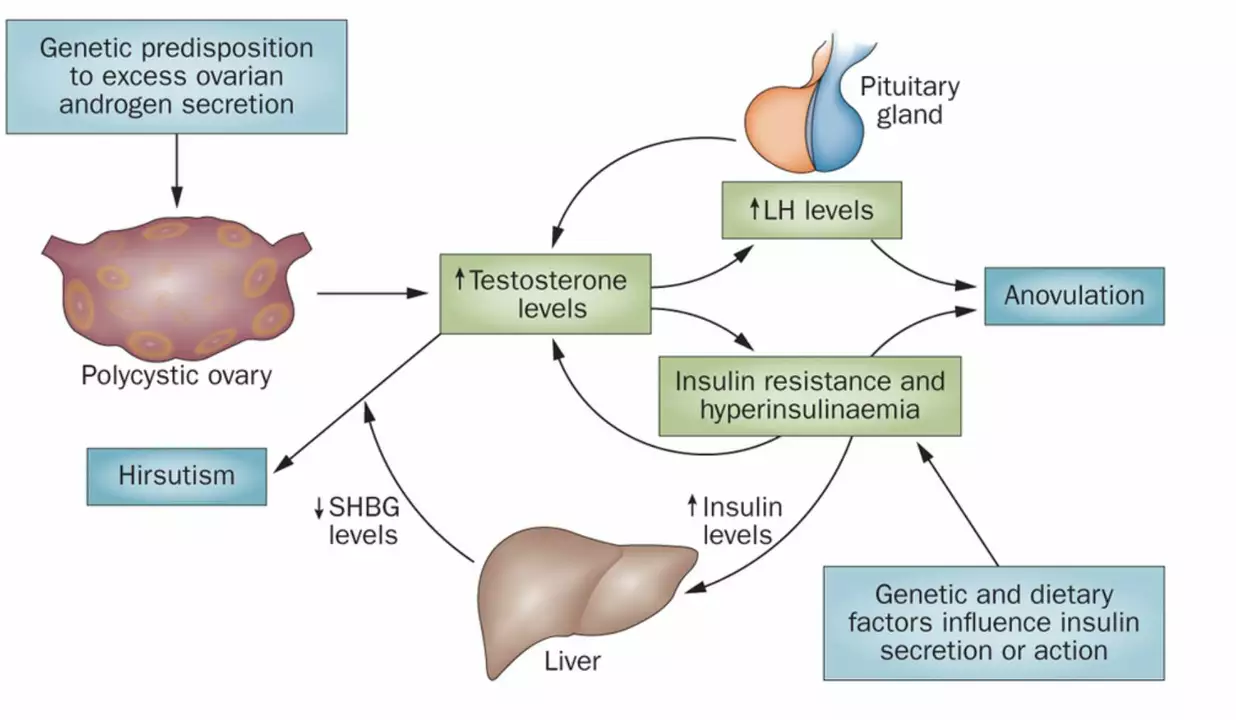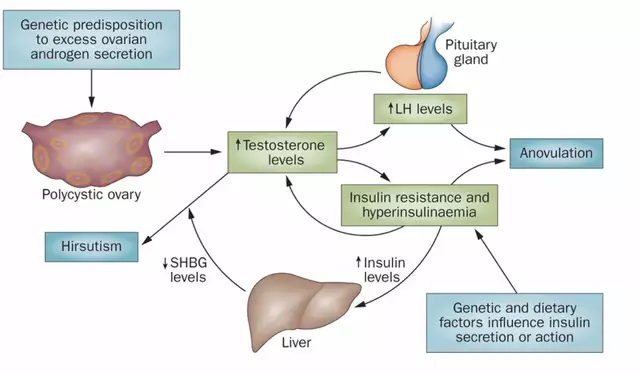Understanding Polycystic Ovary Syndrome (PCOS)
As a woman, I understand that Polycystic Ovary Syndrome (PCOS) is a common hormonal disorder that affects millions of women worldwide. It is characterized by enlarged ovaries with small cysts on the outer edges. PCOS can lead to various health issues, including infertility.
In this article, I will be discussing the connection between PCOS and infertility, along with the symptoms, causes, and treatment options available. By understanding more about PCOS, women can make informed decisions about their reproductive health and overall wellbeing.
How PCOS Affects Fertility
PCOS affects a woman's fertility in several ways. The main issue lies in the hormonal imbalances that are present in women with PCOS. These imbalances can interfere with the normal menstrual cycle, making it difficult for women to ovulate regularly.
When a woman with PCOS does ovulate, the egg released may be of poor quality due to the hormonal imbalances. Furthermore, the high levels of insulin present in women with PCOS can also contribute to an unhealthy environment for egg development and implantation. These factors combined can significantly decrease a woman's chances of conceiving naturally.
Recognizing the Symptoms of PCOS
As a blogger, I want to make sure that you are aware of the common symptoms of PCOS, which can include irregular periods, excessive hair growth, acne, and weight gain. However, not all women with PCOS will experience all of these symptoms, and some may not even have any visible signs of the condition.
It's important to keep in mind that the severity of symptoms can vary greatly from one woman to another. If you suspect that you may have PCOS, it's crucial to consult a healthcare professional for a proper diagnosis and appropriate treatment options.
Identifying the Causes of PCOS
Although the exact cause of PCOS is still unknown, researchers believe that several factors may contribute to the development of the condition. These factors include genetics, insulin resistance, and inflammation.
Insulin resistance is when the body's cells do not respond properly to insulin, causing the pancreas to produce more insulin to compensate. This excess insulin can then lead to an increase in androgen production, which can interfere with the normal functioning of the ovaries. Inflammation, on the other hand, can also contribute to the production of androgens and exacerbate PCOS symptoms.
Diagnosing PCOS and Infertility
If you suspect that you may have PCOS and are struggling to conceive, it's essential to seek medical advice. A healthcare professional will typically conduct a physical examination, discuss your medical history, and may order blood tests to check hormone levels and other factors that could indicate PCOS.
An ultrasound may also be performed to visualize the ovaries and check for the presence of cysts. If PCOS is diagnosed, your healthcare provider will discuss potential treatment options to manage your symptoms and improve your chances of conceiving.
Treatment Options for PCOS and Infertility
There are several treatment options available for women with PCOS who are trying to conceive. These treatments aim to regulate the menstrual cycle, improve insulin resistance, and increase the chances of successful ovulation. Some of the most common treatments include:
Lifestyle Changes
Adopting a healthy lifestyle by eating a balanced diet and engaging in regular physical activity can help manage PCOS symptoms and improve fertility. Weight loss, in particular, has been shown to help regulate the menstrual cycle and increase the chances of ovulation in women with PCOS.
Medications
There are several medications that may be prescribed to women with PCOS to improve fertility. These medications can help regulate the menstrual cycle, induce ovulation, and manage insulin resistance. Common medications include Clomiphene Citrate, Metformin, and Gonadotropins.
Assisted Reproductive Technologies (ART)
If conventional treatments are not successful, women with PCOS may consider assisted reproductive technologies such as In Vitro Fertilization (IVF) or Intrauterine Insemination (IUI). These procedures can help increase the chances of conception by bypassing some of the issues related to PCOS and infertility.
Managing PCOS During Pregnancy
For women with PCOS who successfully conceive, it's important to continue managing the condition throughout pregnancy. This can help reduce the risk of complications such as gestational diabetes and preterm birth.
Prenatal care, regular checkups with your healthcare provider, and maintaining a healthy lifestyle can all contribute to a successful pregnancy for women with PCOS.
Conclusion
In conclusion, the connection between Polycystic Ovary Syndrome and infertility is undeniable. However, with appropriate treatment and lifestyle changes, many women with PCOS can successfully conceive and have a healthy pregnancy.
By understanding the symptoms, causes, and available treatment options for PCOS, women can take charge of their reproductive health and improve their chances of starting a family.



Chloe McDonald
May 6, 2023 at 21:54I was diagnosed with PCOS last year and honestly, I didn't realize how much it affected my cycle until I started tracking it. Simple stuff like walking 30 mins a day and cutting out sugary drinks made a huge difference. You don't need to be perfect, just consistent.
Danie Joy
May 7, 2023 at 12:24they say pcos is hormonal but what if its the chemicals in our water? or the plastic containers? or the government putting stuff in the food to keep women from having kids? i mean... why else would so many young women be affected? 🤔
Katherine Stapp
May 8, 2023 at 04:32I'M SO MAD THIS IS SO COMMON 😭 WHY DOESN'T THE GOVT DO MORE?? I LOST 6 MONTHS OF MY LIFE TRYING TO GET PREGNANT AND NO ONE TOLD ME THIS WAS A THING!! 🤬 #PCOSawareness #womenshealthcrisis
Frank De Silva
May 8, 2023 at 04:51The article is technically accurate, but it's oddly reductive. It ignores the socioeconomic barriers to accessing Metformin or IVF. Most women can't afford to "just lose weight" or take Clomid for months. The real issue isn't PCOS-it's healthcare capitalism.
KJ Miller
May 8, 2023 at 07:48This is such a helpful breakdown. I’ve been coaching a few friends through PCOS lately and I always say: it’s not about fixing your body, it’s about working with it. Small steps matter. Even if you don’t get pregnant right away, managing insulin and stress helps your whole system. You’re not broken.
Claire Battista
May 9, 2023 at 04:54I didn't even know I had PCOS until I was 30. No acne, no weight gain-just irregular periods. My doctor dismissed it for years. Please, if you feel off, keep pushing. Your body's signals matter more than any checklist.
Erin DeGroot
May 9, 2023 at 17:14I want to thank you for writing this with such care. I spent three years feeling like my body was failing me, until I learned PCOS wasn’t a flaw-it was a different rhythm. The emotional toll is real, but you’re not alone. I’m here if anyone needs to talk.
Stephanie Bryant
May 10, 2023 at 03:21metformin helped me so much!! but also-don’t ignore sleep!! i was up at 2am scrolling and my insulin was all over the place. started sleeping 7+ hours and my cycles got regular within 3 months 🙌 also, green tea helps. not magic, just science.
Drashti patel
May 10, 2023 at 15:09In India, many women are told PCOS is just "fat girl syndrome". It’s not. My cousin had it, no weight issue, no acne-just no periods. Took 5 years to get diagnosed because doctors didn’t listen. This article? It’s a lifeline for so many.
Kaitlin Crockett
May 10, 2023 at 20:31IVF isn't a cure. It's a workaround.